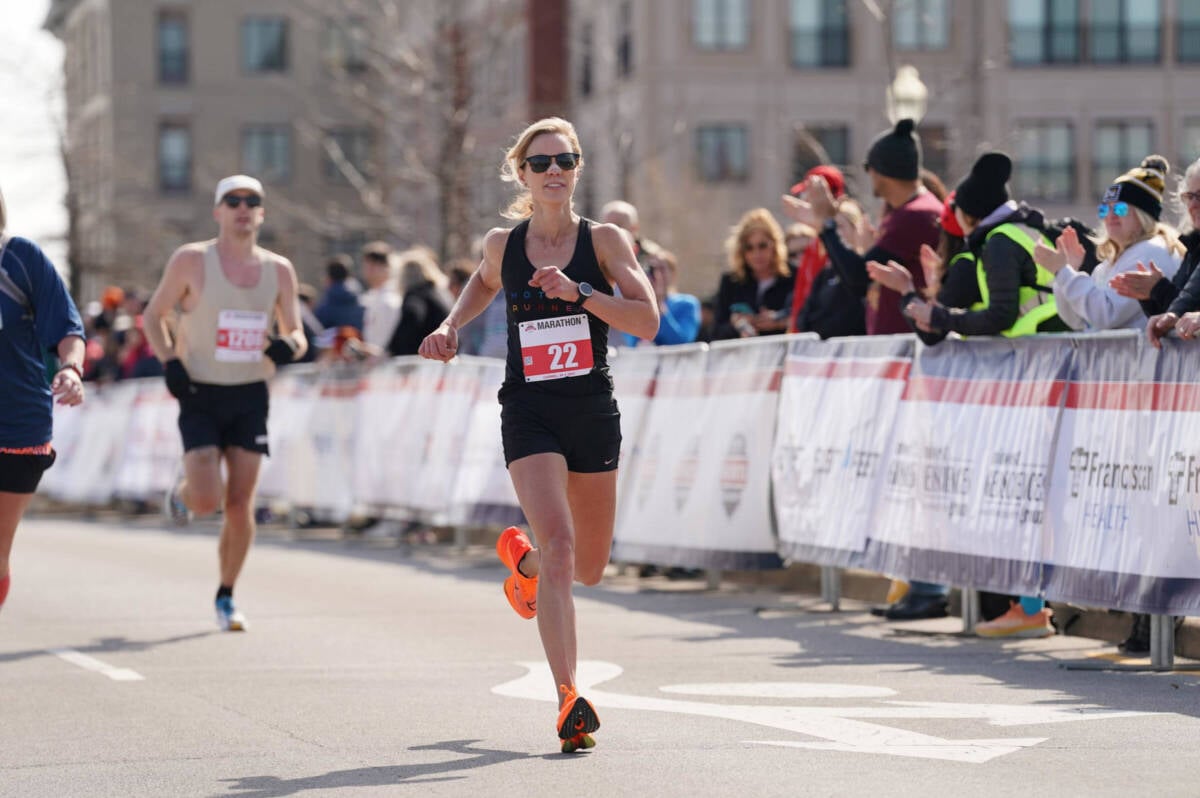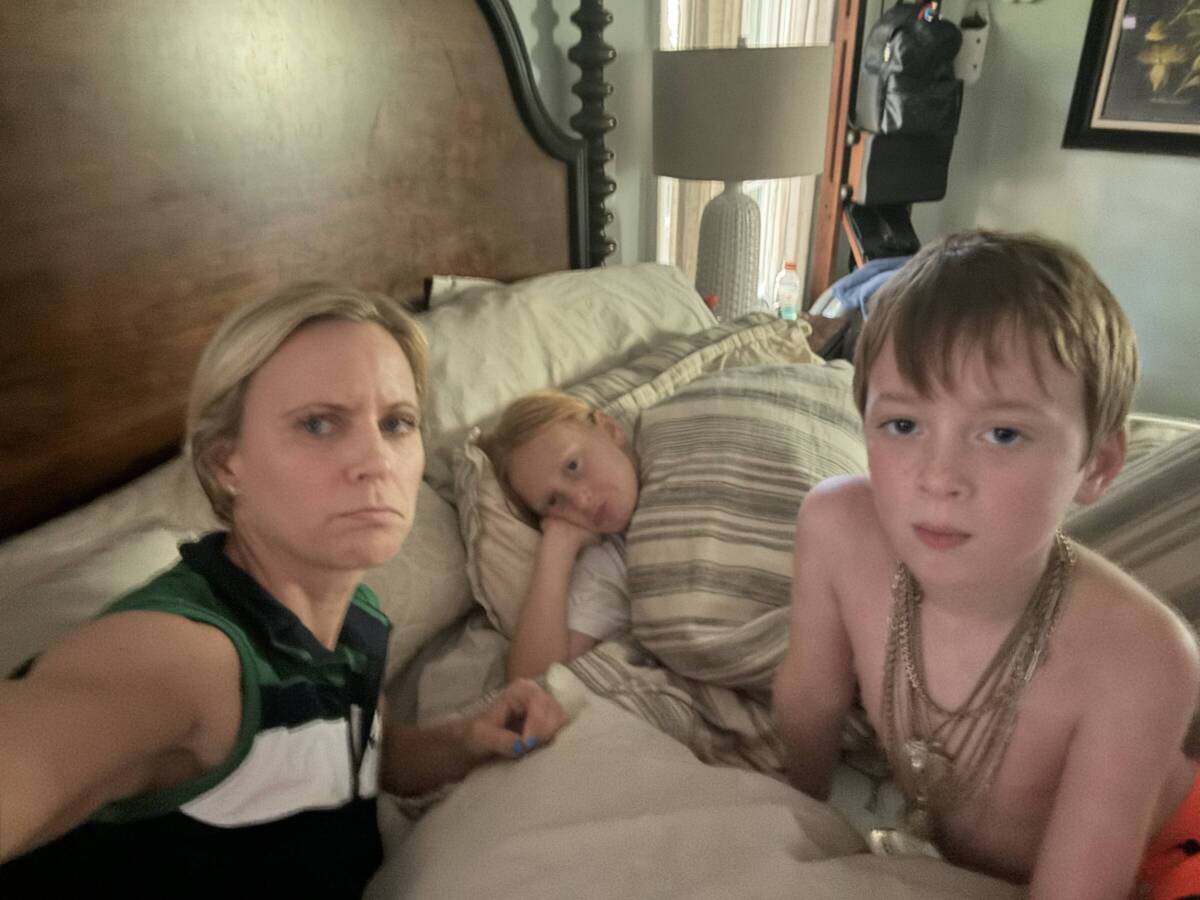How Long After a Marathon Can I Run Again?
It’s a common question runners have–how long after a marathon can I run again? Go online, especially on social media, and you’ll see all sorts of opinions. I saw a reel just the other day of someone flexing that they were running the day after their marathon. Ummm…. not smart.

Why? Because even if your legs can physically run–you have done so much damage to your body running a marathon that it needs time to heal. How much time? At least one week! The athletes I coach have a mandatory one week rest after running a marathon. Some runners I prescribe even longer of a break. Read on to learn how long after a marathon you can run again–and when you may need even longer of a post-marathon rest.
Table of contents
How much time off of running should you take after a marathon?
You should take at least ONE WEEK off running after a marathon—sometimes more, but rarely less. Elite runners regularly take at least a week off running—sometimes more. And for many recreational runners, more than 7 days off running after a marathon is warranted.
Runners who take more time to run a marathon should take up to 10 days off of running after a marathon because they are on their feet longer and may have suffered more muscular damage.
- If your marathon time is 4 hours or less, you should take at least one week of rest from running after a marathon.
- If your marathon is more than 4 hours, you should take at least 10 days off of running after a marathon.
Active recovery exercises like walks and gentle yoga are good to do in the week after a marathon to promote blood flow and accelerate healing.
Why should you not run after a marathon?
You should take time off from running after a marathon because your body needs time to recover from the trauma of running 26.2 miles. Everything from your vital organs to your muscles are damaged when you run a marathon.
Specifically, this is what happens to you when you run a marathon:
- Your muscles are damaged. Studies show that the markers for an acute inflammatory response, C-reactive protein, and acute muscle damage, creatine kinase, are significantly elevated for about a week after the marathon.
- You are depleted. Additionally, your body is depleted in fluids and glycogen even if you are fueled during your marathon.
- Your vital organs are also damaged. Your heart, lungs, liver, and diaphragm are also damaged when you run a marathon. Studies show the heart, lungs and diaphragm are fatigued.
It’s really important to note that EVEN if you feel recovered from running the marathon distance, YOU ARE NOT fully recovered for as many as four weeks after. My legs felt great a week after running my marathon, but inside my body was still working overtime to recover the damaged tissues and organs. This is a time to NOT listen to your body as it could deceive you.
What to do the week after your marathon?
After you run a marathon, you want to eat, hydrate, rest, and do some light activity to promote blood flow. This can help you recover faster after running a marathon so you can start running—and feeling good running.
I go more in-depth on how to recover faster after running a marathon here but below are some tips on what to do in the week after you run a marathon.
6 Actions to Do After Running a Marathon
1. Eat and drink as soon as you cross the finish line—and then keep it up.
Even if you aren’t hungry, it’s important to get some carbs and protein into your system to signal to your body that it’s time to start rebuilding muscle and stocking glycogen stores.
After I crossed the Carmel marathon line, I grabbed a Gatorade and banana even though it was the last thing I wanted to eat. As soon as we walked into the hotel lobby, I grabbed a Fair Life chocolate milk—knowing it had the fats, carbs, and protein my body was desperate for. I then nibbled on a package of graham crackers and sipped Gatorade for the next hour.
In the following days, I continued to eat well and drink throughout the day. Your body is going to be working hard for several days trying to repair the damage running a marathon did to it. So, basically eat as if you are still running—even if you aren’t. A lot of work is happening on the inside.
2. DO NOT RUN—but stay active.
Do not run for at least a week after you run a marathon but stay active in the form of active recovery. After the CIM marathon, I made the mistake of sitting on my duff too much. Well, not really—does a mom ever really do that? But I did neglect the typical bodywork I do when I am training.
Typically, two to three times a day, I do a quick mobility routine to keep my joints loose. I’ll also do yoga, band work, foam roll and go for walks if I have time. Going for walks—even if your legs are still sore—will help you feel so much better. I highly recommend walks or light cross-training activities in the week after a marathon.
3. Use recovery tools.
There are a plethora of recovery tools out there—and many of them are well, hogwash. But I have tried so many and do believe the following helped me recover faster in the week after my marathon.
In the hotel right after my marathon, I put on Bob and Brad’s Compression boots and had them massage my legs while I refueled, texted, and Instagrammed (yes, I made that a verb). Compression boots help get the blood flowing so oxygen can do its thing repairing damaged muscles.
In the car ride, I put on my Firefly Recovery straps which I regularly used after my long runs this training cycle, and felt a marked difference in how my legs felt the next day. Firefly increases blood flow by 400 percent. Amazingly, my legs were not incredibly sore the day after my marathon and felt almost back to normal three days after my marathon!
4. Sleep! As much as you can.
It is difficult to sleep the night after a marathon, but in the week after a marathon, it’s important you get a full night’s sleep (at LEAST 7 hours) every night. During sleep is when your body releases hormones like HGH to rebuild your muscles. If you skimp on sleep, you skimp on recovery AND put yourself at risk for injury.
Because you aren’t running the week after the marathon, hopefully, that means you can set your alarm later and catch some more shuteye. I was sick with a bad cold when I ran the Carmel Marathon. It turned into a nasty sinus infection in the days after the marathon—so it seemed like I couldn’t get ENOUGH sleep. Being sick did force the issue because I knew getting as much as I could helped me feel better (plus I was very fatigued anyway from the illness). In a way, it was a blessing because it helped me get the rest I needed.
5. Get a massage.
Please do me a favor and book a massage in the week after the marathon. Getting a massage after a marathon may help you recover faster but it will be a nice reward for all the hard work you’ve put in in the last several months. It has been proven to have psychological benefits for recovery.
It’s best to do a massage about 3-4 days after your marathon. Ask for a massage that flushes the legs. You don’t want one that is intense and really grinds the muscle. You want one that promotes blood flow.
Long strokes and gentle kneading of the tissue are what you want! You can request a soft tissue massage or find a sports massage therapist. Be sure you tell them that you just ran a marathon!
My secret weapon to staying healthy this past year after being injured for almost three has been seeing a neuromuscular massage therapist (I love you Sandra!) almost weekly to work on my problem areas. After CIM, I had to wait a week and a half to see her—and then took a break while I rebuilt my mileage. That was a mistake. My body was recovering and needed her magical hands more than ever.
After the Carmel marathon, I have kept my standing 30-minute massage with Sandra and continue to feel better week after week.
6. Build your mileage back gradually.
You can start running after a marathon if you don’t:
- Have residual soreness
- Feel fatigued
- Have difficulty sleeping
- Experience an abnormal appetite or thirst.
If your body feels mostly recovered (bear in mind, it’s not though—it can still take a month to recover from a marathon), you may begin running.
In general, trained runners can start running after a marathon doing what looks like a reverse taper for a marathon. These percentages will vary depending on a runner’s total volume but in general, a reverse taper may look like:
- Week 1: no running, only active recovery such as walking or light cross training
- Week 2: flex week of running mileage up to 30 percent of the total peak running volume of the previous marathon cycle. This may look like 2-5 miles of running 3-5 days.
- Week 3: easy running of up to 50 percent of total peak running volume
- Week 4: easy running with strides of up to 75 percent total peak running volume
- Week 5: depending on how you feel, you may repeat week 4 or week 3, or close to 100 percent previous total weekly running volume.
It is normal for your legs to feel fatigued and heavy for a month or so after a marathon. However, if you are feeling fatigued, have an abnormally high heart rate, or running just feels harder than it should—listen to your body and cut back. It won’t do you any good digging yourself deeper into a hole that will take longer to recover from.
If you want guidance with your running goals, including returning after a marathon, check out my run coaching services. How much time do you typically take off after running a marathon?






